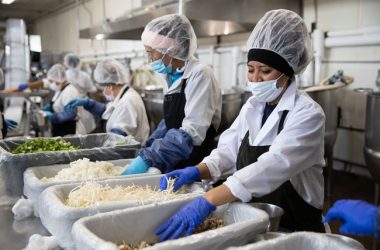Rosalba Ruiz and her husband, Alfonso, have built a successful concrete business over the past year in Salem.
But Ruiz said as a small, newer enterprise, Eagle Concrete & Construction still struggles to land contracts and be competitive with larger companies bidding for jobs.
“I needed more education,” Ruiz said, explaining that she didn’t always know how to complete tasks like making a safety plan or administering benefits for employees.
She found it through Salem’s Latino Business Alliance.
Ruiz and her husband are among about 20 small business owners now taking classes through the Latino Microenterprise Development Program, a collaborative effort between several local economic development organizations that launched this year.
The weekly courses began in the fall, and cover topics including required insurance, securing capital and business development.
At the completion of the program, participants are eligible for a microloan of $1,000 to $15,000 to start or grow their business.
Jose Gonzalez, board member and past president of the Latino Business Alliance, said the program aims to give Laitno entrepreneurs easier access to capital. Banks typically make larger loans for businesses, he said, and people seeking under $100,000 are often referred to personal loans which require collateral like a house or other credit.
“A lot of people in the Latino community, they don’t have those assets,” he said.
The business owners participating are diverse and include heating, ventilation and air conditioning; a food truck owner, a painter and an import/export business, said David Rheinholdt, president of the Latino Business Alliance.
Yolanda Castellanos and her husband Bernardo enrolled in the classes hoping to expand their Salem business, Jaliax. She sells cookware and wants to offer more classes to customers on cooking and healthy eating. The small space they rent for an office isn’t enough to allow her to grow.
“We basically rent a desk,” she said, speaking in Spanish.
She said the classes so far have helped her better understand local resources to help business owners, like the locations of various government offices that can help with setting up and running a business. Castellanos said she wants to share that knowledge with other Latino business owners who often don’t realize what’s out there.
Language remains the largest barrier for Latino business owners, Castellanos said, and often limits the information they can readily access. Start-up costs are also a challenge.
She said if Jaliax is eligible for a loan at the end of the program, she’d like to use it to secure a larger space.
Classes are also intended to help business owners understand how to build credit and better understand American business practices and regulatory requirements.
Presenters typically speak in English, with professional interpreters offering simultaneous translation into Spanish through earpieces.
“The goal is to really show them that they need to separate their personal finances from their business and have their business stand on its own feet,” Gonzalez said.
Participants meet at Chemeketa Community College’s Center for Business and Industry in downtown Salem. The classes are a joint effort between the Latino Business Alliance, a nonprofit, as well as Chemeketa and Advanced Economic Solutions, which worked together to develop the class curriculum.
Salem’s Strategic Economic Development Corporation helped the group apply for funding from Business Oregon, and the Mid-Willamette Valley Council of Governments is setting up the loan program, to be managed by the Latino Business Alliance, said Michael Miller, marketing coordinator for SEDCOR.
The program got $100,000 from federal Covid relief funds allocated by Rep. Raquel Moore-Green.
After nearly 50 people showed up to an initial orientation in the summer, Latino Business Alliance leaders began seeking more money.
“That’s when we quickly realized that our $100,000 was not going to be enough,” Rheinholdt said.
A recent $25,000 grant from the Oregon Community Foundation will add to the pool available for loans.
Ruiz said she enrolled mostly for the content of the courses, and said they’ve already helped her with tasks like creating a safety plan for Eagle Concrete and better understanding insurance coverage.
But she said the business could use a loan to expand. Right now, they only have one truck.
“What would happen if that breaks down?” she said.
Another truck would give them peace of mind and help expand their operations.
“If we qualify, everyone would like to grow,” she said.
Contact reporter Rachel Alexander: [email protected] or 503-575-1241.
JUST THE FACTS, FOR SALEM – We report on your community with care and depth, fairness and accuracy. Get local news that matters to you. Subscribe to Salem Reporter. Click I want to subscribe!

Rachel Alexander is Salem Reporter’s managing editor. She joined Salem Reporter when it was founded in 2018 and covers city news, education, nonprofits and a little bit of everything else. She’s been a journalist in Oregon and Washington for a decade. Outside of work, she’s a skater and board member with Salem’s Cherry City Roller Derby and can often be found with her nose buried in a book.









